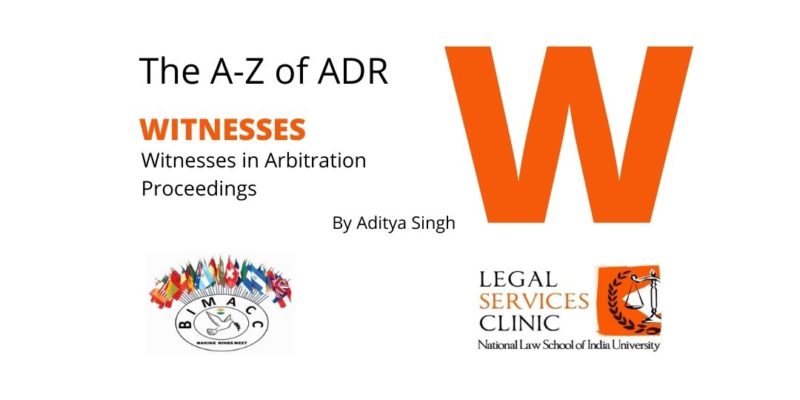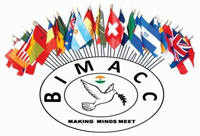
A-Z of ADR: Witnesses in Arbitration Proceedings
-Aditya Singh (IIIrd Year, NLSIU Bangalore)
It is a settled principle of law that Arbitrators and Arbitration tribunals are not bound by the rules of the Code of Civil Procedure, 1908 and the Indian Evidence Act, 1872.[1] But the courts have time and again clarified that this statutory exemption cannot exempt them from the duty to conform with the principles of natural justice.[2] Recently the Bombay High Court in Pradyuman Kumar Sharma and Ors. Vs. Jaysagar M. Sancheti and Ors[3] went to the extent of saying that “even though the arbitrator is not bound by CPC or the Evidence Act, the principles of CPC and the Evidence Act are applicable to even arbitration proceedings.”
This shall serve as the premise for the discussion on what expert and fact witnesses are, and how they should be dealt with in arbitration proceedings.
Expert Witnesses and Factual Witnesses
A factual witness within the meaning of the Indian Evidence Act, 1872 can be any person who comes before the court to give an oral testimony with respect to a relevant fact or a fact in issue. The importance of such witnesses is owing to the fact that the definition of evidence[4] is limited to just documentary evidence, evidence produced in court by way of an original document and oral evidence, evidence provided through direct testimony of a witness. On the other hand, an expert witness is a professional with an in-depth knowledge of a particular subject, the matter may vary from technology, financial accounting, to even scientific research. The need for such witnesses in any proceeding arises when the relevant fact or the fact in issue is so complex that the legal counsels and the arbitrator/judge lack the capacity to effectively comprehend the matter so as to argue or adjudicate upon it.[5]
Another aspect that separates the two kinds of witnesses is the manner of their introduction. Inherently, all factual witnesses are introduced by either of the two competing parties, but in case of expert witnesses, they can be from either of the parties or consult on the case at the request of the tribunal itself. The arbitral tribunal’s power to appoint expert witnesses has been recognized by section 26 of the UNCITRAL Model Law, but, giving effect to the utmost importance of party autonomy, section 5 of the IBA Rules on Taking of Evidence in International Commercial Arbitration clearly specifies that the tribunal has to seek the consent of both the parties before appointing any expert. But when it comes to party-appointed experts, the obvious presumption of bias remains and so, in addition to stating their name, qualification, and opinion on the matter at hand, the experts are also expected to fully disclose their prior relationship with the parties and their legal counsels for their opinion to be considered by the tribunal.[6]
The next aspect of all trials is chief-examination of the witnesses from both the parties, but keeping in view the efficiency and speedy disposal expected from arbitrations, most tribunals prefer to have the witnesses file an affidavit in place of conducting an examination-in-chief and skip right to the cross-examinations of the witnesses on record.
It is important to mention here a contrasting opinion taken by Indian courts when it comes to recording evidence of witnesses not physically present before a tribunal. Around the world arbitral tribunals governed by rules of leading institutions like LCIA and ICC etc. turn to video conferencing as the preferred mode of recording witness testimony for witnesses unable to be physically present before the tribunal.[7] But, in a recent decision of the Bombay High Court,[8] the court decided that the best mode of obtaining the evidence of a witness not physically present before the tribunal is to have a commission go to the witness and record his evidence, which will then be brought back and presented before the tribunal. The major flaw in this approach remains the additional costs, and the delay in proceedings, but, the court while weighing such concerns still held that a testimony before a commission is more authentic than one recorded over video conferencing.
Cross-Examination of Witnesses in Arbitration
The basic essence of arbitration was always to avoid the rigour and standards a courtroom holds you up to, and find a solution not based on rules or law but mutual benefit. But recent decisions of the Indian courts that have made observations like, “cross-examination of witnesses is essential for a just and fair award”.[9] This mindset within the Indian framework is particularly detrimental with respect to arbitrations because most matters that are up for arbitrations are document-driven where the facts are rarely in dispute, the only dispute refers to a breach or the interpretation of a clause etc, and even the witness testimonies are always admitted by way of an affidavit.
Generally, the reason why cross-examinations are conducted in an arbitration proceeding is to discredit the testimony of a witness or to highlight a particular document before the tribunal.[10] But due to the aforementioned approach of Indian courts cross-examination is a norm for almost all domestic arbitrations. Such procedures elongate the process of arbitration because it becomes a show of skill for the counsels rather than a forum of beneficial bargaining for the parties.
Though it cannot be said that cross-examinations are completely irrelevant because in cases of expert witnesses if their testimonies are allowed to stand unchallenged, it can lead to a subconscious bias in the mind of the arbitrators. But where fact witnesses, giving evidence through affidavits, are concerned, there should not be a mandatory disposition towards cross-examination, and this is something that should certainly be done away with.
[1] S. 19, Indian Arbitration and Conciliation Act, 1996;
[2] Soceite Aninmina Lucchesse Oil Vs. Gorakhram Gokalchand, AIR 1964 Mad 532.
[3] Pradyuman Kumar Sharma and Ors. Vs. Jaysagar M. Sancheti and Ors, 2013 (5) MhLj 86.
[4] S. 5, Indian Evidence Act, 1872.
[5] Ernest & Young, ‘The crucial role of expert witnesses in arbitration’, (Forbes, 24 June, 2016), <https://www.forbesindia.com/blog/economy-policy/the-crucial-role-of-experts-in-arbitration/> accessed on 26th July, 2020.
[6] S. 5.2, IBA Rules on Taking of Evidence in International Commercial Arbitration, 1999; A. 23-24, Indian Arbitration Forum, Guidelines for Conduct of Arbitrations ( February, 2020) < https://indianarbitrationforum.com/wp-content/themes/iaf/assets/IAF-Draft-Guidelines.pdf> accessed 27th July, 2020.
[7] A. 14 & 19.2, LCIA Arbitration Rules, 2014; A. 22 & 24, ICC Arbitration Rules, 2017; Hanrao Shipping v Cofftea Trading, [2015] EWHC 4293 (Comm).
[8] Stemcor Pvt. Ltd. v Mideast Integrated Steels Limited, Arbitration Petition No. 332 of 2018.
[9] Rajesh P. Thakkar v M/s Kotak Mahindra Bank Ltd., 2012 (1) MhLJ 119.
[10] R. Harbast, ‘Cross-Examination, A Counsel’s Guide to Examining and Preparing Witnesses in International Arbitration’, (Kluwer Law International, 2015) 98.
-Aditya Singh (IIIrd Year, NLSIU Bangalore)
Aditya Singh is a Third Year Law Student at the National Law School of India University (NLSIU), Bangalore.
BIMACC expresses its gratitude towards the author and to the members of the Legal Services Clinic, National Law School of India University (NLSIU) for their support in our collaborative efforts to promote ADR with this series titled “A-Z of ADR”. The purpose of this series is to increase the understanding of certain fundamental concepts of Alternative Dispute Resolution.
The Legal Services Clinic is a student-run committee that provides free legal services to the socially and the economically backward sections of the society who have difficulty accessing the judicial system. It also has a mandate of spreading legal awareness and providing free legal assistance to those who cannot afford it.
Website: www.legalservicesclinic.org/
Facebook: @legalservicesclinic
Email: lsc.nlsiu@gmail.com
Phone Number: 073586 73214
Disclaimer: The views and opinions expressed in this blog are those of the author and do not necessarily reflect the official policy or position of BIMACC, any of the members of the Board, or the empanelled neutrals.
